Brooke India's training programme improves diagnosis of deadly glanders disease
Glanders is an infectious equine disease that is still prominent in parts of India today. It causes suffering and inevitable death to equines, whilst threatening the livelihoods of the owners who depend on them. If left unchecked, the disease can spread quickly.
Brick kiln workers in India
Brick kiln worker Tejpal relies upon his six horses to earn a living. When he returned home at the end of the brick kiln season, all six of his horses had started showing worrying symptoms.
As well as difficulties with breathing, they had developed painful looking sores and were having intermittent nose bleeds.
Tejpal did not recognise these symptoms but contacted a local paravet, who unfortunately was not able to diagnose the problem either.
As his animals’ condition was deteriorating, Tejpal and his paravet contacted Brooke India directly.
Brooke India Vet Dr Asheesh Pratap Singh, concerned about the symptoms these horses were displaying, went to Tejpal’s village to examine his horses. Unfortunately, on arrival Dr Asheesh diagnosed all six horses with glanders.

Glanders is a notifiable disease, and once Dr Asheesh had advised the government of the outbreak, the local administration and Animal Husbandry Department pressed into action to ensure the disease was contained.
For owners like Tejpal, a glanders diagnosis is a worst case scenario. There is no cure and all his horses would need to be euthanised to end their suffering and prevent the disease from spreading. The devastating impact this can have on the livelihoods of owners, means that owners often hide their animals away, hesitant to report the disease to the government.
We need your help
To reach more horses, donkeys and mules, and provide better support for owners to create lasting change.
Fortunately, there is compensation available from the Indian Government Treasury to encourage owners to alert the government if they suspect their animal may be suffering with glanders, whilst allowing owners like Tejpal to get back on their feet. Brooke India had previously advocated the government to increase this compensation and so was able to guide Tejpal through this process. Within a week Tejpal had received compensation, enabling him to purchase more horses and continue working.
I am happy Dr Asheesh and his team guided us through the tough times and I am sure they will continue to provide their expert guidance in the comings days.
Meanwhile, Tejpal’s case had highlighted to Brooke India that more awareness raising on the ground was needed. Brooke organised training for local service providers on how to identify the clinical signs and symptoms of glanders, and what to do upon diagnosis. It is a zoonotic disease, and although cases in humans are rare, Brooke always stresses the importance of hygiene when an infected equine is diagnosed.
Brooke community facilitator conducting awareness session
As well as training local paravets, Brooke India identified the need to also make horse owning communities aware of the symptoms of this deadly disease, and the compensation available to them if their equine was to contract it. Brooke’s team organised a series of educational sessions in the neighbouring villages to do this. The team adopted a holistic approach by involving a variety of stakeholders in their glanders sensitisation, including owners, the local service providers, Government Livestock Extension Officers and Ashwamitras (equine friends).
This approach has already proved a success. Just one month later, when Tejpal’s friend recognised the symptoms in some local horses, Tejpal immediately contacted the local government, who tested and subsequently euthanised 40 horses suffering with glanders. Tejpal’s timely response was critical in curbing the glanders outbreak.
There is still a lot of work to be done to combat this deadly disease, but Brooke India has made great progress. This is an excellent example of Brooke using its specialist knowledge to advise, advocate and engage with a variety of members of the community to combat a pressing equine welfare issue.
We work in 3,245 brick kiln sites offering emergency vet treatment and vaccinations as well as advice on disease prevention.
Donkeys, mules and horses work in traditional brick kilns - brick making factories - of India, Pakistan, Nepal and Afghanistan.
